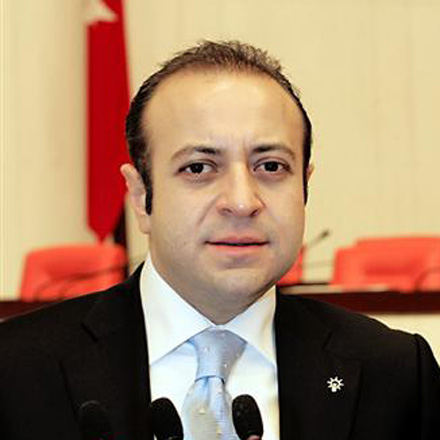Ria Oomen-Ruijten, the European Parliament (EP) rapporteur on Turkey, met with Turkish officials on Wednesday in Ankara and said EU Affairs Minister Egemen Bagis should watch his language when talking to EU officials Today`s Zaman reported.
Speaking to the Cihan news agency after having talks with Bagis on Wednesday, Ruijten said the Turkish EU minister sometimes puts EU officials in a difficult position and complained about the "harsh rhetoric" Bagis uses with them.
When the European parliamentarians rebuked Turkey for its handling of the summer protests in Turkey, Bagis accused some European officials and politicians of making "irresponsible" statements and "talking nonsense" for the sake of media attention.
"Some parliamentarians should understand that there is a price to pay for talking this comfortably and daringly about Turkey's internal matters," Bagis said in mid-June while the protests were still ongoing and added, "Turkey is not a banana republic."
His criticism came after the European parliamentarians approved a resolution in mid-June that criticized the Turkish government for the police crackdown on protests, yet fell short of outright condemnation of Turkey's actions.
The protests that swept Turkish cities during the summer started in opposition to the redevelopment of İstanbul's Gezi Park but soon became violent with the involvement of marginal groups. Clashes with police left four protesters and one police officer dead and about 7,500 injured.
In response to Bagis's criticism, EU-Turkey Joint Parliamentary Committee Vice Chairman Maria Eleni Koppa and British Socialist Member of Parliament Richard Howitt had said in a joint statement, "It is disappointing that the Turkish politician with the greatest responsibility to lead his country toward the European Union has chosen to use words that can only make his and our task more difficult."
"Turkey's EU minister sometimes makes things difficult for us in Europe," Ruijten told Cihan on Wednesday and added: "He sometimes intentionally uses harsh rhetoric. He [Bagis] will get a response from me if he uses harsh words on an issue that is related to me."
Ruijten underscored that she had also expressed these complaints about Bagis's rhetoric to him directly. "I told Mr. Bagis that he should use this type of language only in internal politics. I told him that such harsh language creates a negative reflection in Europe," added Ruijten.
Highlighting that the EU and Turkey should strengthen their relations, Ruijten noted that there were many common interests between Turkey and the bloc.
Ruijten also commented on a recent decision made by the European Union's General Affairs Council approving talks on the opening of a new chapter in Turkey's EU accession.
The European Parliament rapporteur on Turkey said the opening of Chapter 22 on Nov. 5 will breathe new life into Turkey's EU bid.
Ruijten arrived in Ankara on Wednesday to meet with Parliament Speaker Cemil Çiçek and Bagis. Ruijten was due to meet with President Abdullah Gül on Thursday and travel to İstanbul later in the day for talks with officials from Turkish opposition parties and NGOs.
Ruijten's visit follows the release of the 2013 European Commission Progress Report on Turkey in mid-October.
In the report, the bloc's executive arm recommended reinvigorating Turkey's EU bid, while also saying that the Turkish police used excessive force when dealing with the Gezi Park protesters.
The progress report also hailed Turkey's reform efforts, namely the adoption of an important judiciary reform package, the announcement of a democratization package and the start of talks aimed at ending terrorism and violence in the country's Southeast and to pave the way for a resolution of the Kurdish issue.
On Tuesday, Prime Minister Recep Tayyip Erdogan said the Commission's 2013 progress report was more "well-intentioned" when compared to previous years' reports. "Of course, there are points on which we disagree [with the Commission]," added Erdogan during a joint press conference with his Romanian counterpart Victor Ponta. He also noted that the democratization package and other reforms were mentioned in the progress report.
The progress report lauded the Turkish government for maintaining its overall commitment to further democratization and political reforms but at the same time criticized the "divisive political climate" that prevailed in Turkey, in particular the government's "uncompromising stance" during the summer protests.
Ruijten and Bagis were expected to discuss the issues raised by the European Commission in the progress report on Wednesday.
Speaking to reporters after the closed-to-press meeting, Bagis said Ruijten had offered "constructive criticism" about Turkey during their conversation. Bagis said that although some of Ruijten's criticism in the past had "saddened" Turkey, her comments still helped raise standards in the EU candidate country.
Bagis said he believed Ruijten's reports will continue to light the way for Turkey.
"This year, the European Commission has published a far more realistic report when compared to past years. I guess that the report to be published by the European Parliament [on Turkey] will also be constructive," said Bagis.
Ruijten is expected to draft a progress report on Turkey that will be voted on by the Foreign Affairs Committee of the European Parliament later in March. When Ruijten's draft report is approved by the foreign affairs committee, the report will then be voted on by the lawmakers in the European Parliament in April and endorsed.
"Nov. 5 is a turning point in Turkish-EU relations. Because for the first time after a three-year gap, we will be opening a new chapter," Bagis added. He said that the decision to open Chapter 22 was important as it also signaled that Turkey may soon be able to begin talks on Chapter 23 and 24, the two chapters that cover issues related to the judiciary, fundamental rights, freedom and security.
With the opening of Chapter 22 in November, the EU and Turkey will put an end to the three-year hiatus in accession talks.
"Once the Cyprus issue is resolved, once the reunification of Cyprus happens, all 14 EU chapters blocked over that issue will also be unblocked," added Bagis.






